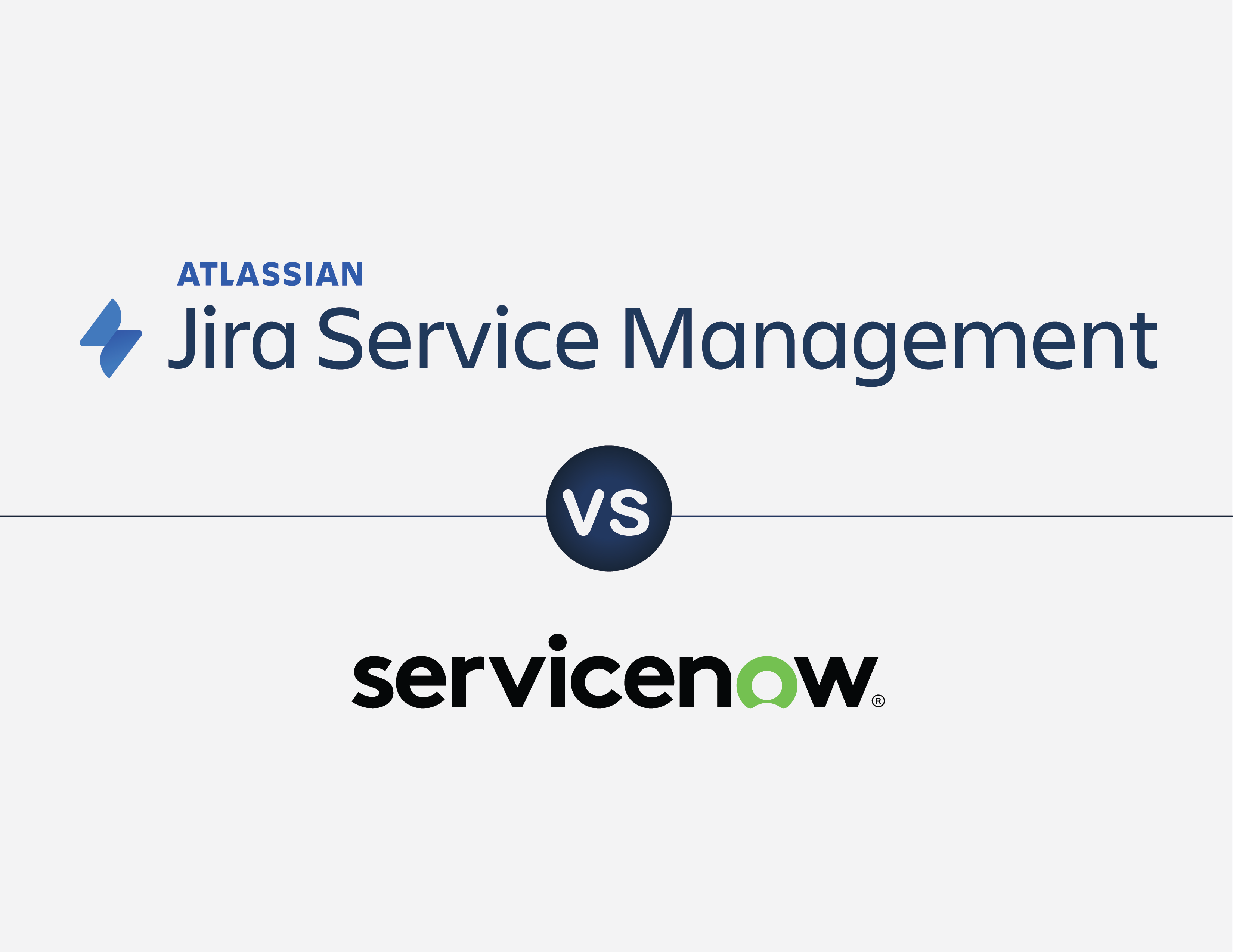SERVICENOW VS JIRA: WHICH ITSM PLATFORM IS RIGHT FOR YOUR BUSINESS?
Businesses seek IT Service Management (ITSM) platforms that provide flexibility, scalability, and seamless integration into their current ecosystems. Jira Service Management and ServiceNow are two popular options. Both have distinct capabilities aimed at improving IT operations, but they serve ITSM requirements in different ways.
In this comparison, we will compare ServiceNow vs Jira covering six different categories to help you decide which platform is ideal for your business.
Skip to:
Ease of Use and Implementation
API and Apps Available
Third-Party Compatibility
Pricing
Community and Support
Security
Overview: ServiceNow vs Jira
Before diving into the specifics, it's important to define what each tool offers.
Jira Service Management, though newer to the ITSM (IT Service Management) and ESM (Enterprise Service Management) space, has quickly become a powerful solution covering a diverse set of solutions. It’s particularly popular with small and medium sized businesses and increasingly with larger enterprises that benefit from flexibility and easy adoption as it seamlessly integrates with the rest of the Atlassian ecosystem (Jira Software, Bitbucket, Opsgenie, StatusPage and Confluence).
ServiceNow is a cloud-based ITSM platform designed to automate and streamline business processes. Originally focused on IT operations, it has expanded into areas like human resources and customer service management, making it a go-to for large enterprises with complex needs.
1. Ease of Use and Implementation
Particularly important for smaller teams is how easy a platform is to set up and start using. Not every business has the technical knowledge, or time required to implement solutions like these easily.
Jira and ServiceNow are powerful, which means there is a learning curve for both, however when comparing ServiceNow vs Jira, Jira gets the upper hand as the more user-friendly platform with an intuitive interface.
Key features in Jira:
- Drag-and-drop interfaces
- Customizable dashboards
- Intuitive ticket management
- Mobile apps for on-the-go access
ServiceNow is a little more complex, particularly for those teams without the right technical experience. However, recent updates have focused on:
- Customizable workspaces
- Natural language search
- Guided setup experiences
- Mobile apps with core functionality
With Jira Service Management vs ServiceNow, both are feature-rich, but differ a little in user-friendliness. Jira stands out as the more accessible option, offering an intuitive interface allowing teams to get up and running quickly.
2. API and Apps Available
The Atlassian Marketplace provides access to thousands of plugins and apps, enabling teams to create custom workflows without extensive technical expertise. This, combined with Jira's seamless integration across the Atlassian ecosystem, makes it a great choice for teams seeking quick, efficient integrations.
Atlassian's ecosystem includes:
- Comprehensive REST APIs for all Atlassian products
- Atlassian Marketplace with thousands of apps and integrations
- Forge, Atlassian's cloud app development platform
- Connect, for developing on-premises and cloud apps
ServiceNow is designed to handle more complex, enterprise-level integrations through its robust APIs, configuring these often requires specialized technical expertise making the process more complex and costly compared to Jira Service Management.
ServiceNow's offerings include:
- REST and SOAP APIs
- IntegrationHub for code-less integrations
- ServiceNow Store for third-party applications
- App Engine for custom application development
3. Third-Party Compatibility
When it comes to ServiceNow vs Jira in the third-party compatibility category, both platforms perform well, but again, the scale and complexity of integrations set them apart.
Jira Service Management is no slouch in this department and is compatible with a wide range of third-party applications, especially those within the Atlassian ecosystem. With seamless integrations with products like Confluence and Slack, Jira Service Management is well-suited for DevOps and IT teams working in fast-paced environments.
The availability of thousands of third-party apps in the Atlassian Marketplace further extends its compatibility, allowing businesses to tailor their ITSM setup with minimal hassle.
Atlassian's products are designed with integration in mind:
- Native integrations with popular development tools (e.g., GitHub, Bitbucket)
- Extensive third-party integrations available through Marketplace
- Open APIs for custom integrations
- Zapier support for no-code integrations
ServiceNow platform’s integration capabilities are extensive, supporting everything from cloud services to more traditional systems.
ServiceNow also offers strong third-party compatibility:
- Pre-built integrations with major enterprise systems (e.g., SAP, Oracle)
- Integration Hub for connecting with external systems
- Open APIs for custom integrations
- MID Server for secure integrations with on-premises systems
Both platforms excel in third-party compatibility, but Atlassian's deeper roots in the development world often give it an edge in integrating with a wider range of tools commonly used by software teams.
4. Pricing
Cost is, more often than not, a critical factor when considering an ITSM solution, and there is a significant difference in pricing between ServiceNow vs Jira.
The Jira Service Management is more affordable, especially for small to medium-sized businesses. Jira uses a tiered subscription model based on the number of users, making it scalable and cost-effective for growing organizations.
- Pricing starts at a lower entry point
- Transparent and upfront pricing model
- Flexibility allows teams to choose options that best suit their needs
ServiceNow operates as a premium, enterprise-level solution, with pricing models that reflect its target market of large organizations. Its pricing is subscription-based and varies depending on the modules and number of users, making it relatively expensive compared to other ITSM solutions.
5. Community and Support
The level of community resources and customer support plays a crucial role in ensuring a smooth user experience. Both Jira Service Management vs ServiceNow offer extensive support systems, but they differ in their approach.
Jira Service Management, as part of the Atlassian suite, offers free basic online support, customers can also opt to purchase additional higher level TAM if necessary. However, the community-driven environment of Jira makes it easy for users to find solutions quickly.
Atlassian has fostered a strong and active community:
- Atlassian Community forums with active user participation
- Extensive documentation and tutorials
- Atlassian University for official training
- Annual Atlassian Summit event
ServiceNow provides enterprise-grade support with extensive documentation and training programs. The platform offers premium support packages that include 24/7 assistance, dedicated account managers, and tailored onboarding services.
ServiceNow also offers comprehensive support and community resources:
- ServiceNow Community for user discussions
- Knowledge Base with extensive documentation
- ServiceNow Training and Certification programs
- Annual Knowledge conference
Although both platforms have strong communities and support systems, when comparing Jira service management vs ServiceNow, Jira has the upper hand thanks to its efforts to become community-focused.
6. Security
Security, of course, is a top priority when choosing an ITSM platform. From protecting sensitive data to ensuring regulatory compliance, robust security features are essential to safeguard both operations and customer information.
While its security capabilities may not match the extensive offerings of ServiceNow, Jira still meets the security needs of most small to medium-sized businesses. Atlassian has made significant investments to ensure its cloud security framework enables businesses to maintain high security standards.
Key security features of Jira include:
- Industry certifications like SOC 2 and ISO 27001
- Data residency options to address compliance requirements
- Enterprise-grade encryption for data in transit and at rest
- Advanced user authentication options
ServiceNow is more geared towards meeting the needs of those in highly regulated industries such as healthcare, finance, and government. Their extensive range of security capabilities makes ServiceNow an appealing option for risk-conscious businesses.
These extensive security capabilities include:
- Data encryption
- Advanced identity management solutions
- Comprehensive compliance certifications (e.g., SOC 2, HIPAA)
- Frequent third-party security audits
Which Platform is Right for You? Jira vs ServiceNow
The choice between ServiceNow and Jira Service Management largely depends on your organization's size and IT needs.
Jira Service Management is an agile, cost-effective ITSM solution. Its ease of use and seamless integration with the Atlassian ecosystem make it perfect for fast-growing teams that need to quickly adapt without heavy customization or overhead.
ServiceNow is best suited for larger enterprises with complex workflows. Its advanced automation and extensive integrations make it a highly customizable platform. However, its complexity and cost can be a barrier for smaller organizations.
If you’re still unsure, experts at Mumo’s Systems can guide you through the decision-making process, ensuring you make the choice that aligns in sync with your business needs. Contact us today!
FAQS:
Recent posts
-
AtlassianOct 25, 2024
-
AtlassianOct 21, 2024
-
AIAug 13, 2024


